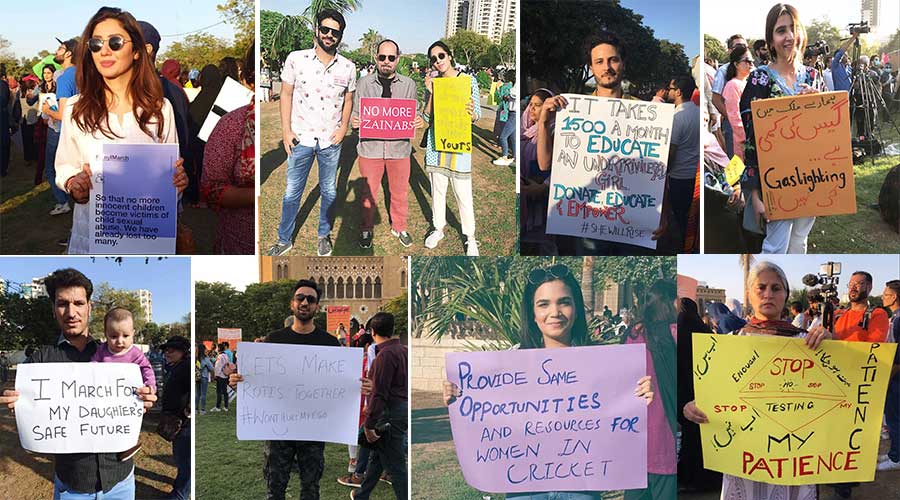FASHION WITH A TOUCH OF CONSCIENCE
- 13 Apr - 19 Apr, 2024
Hay haq hamara, azaadi! We have a lot of issues, a lot is protested on our streets and the nature of these protests is no undocumented secret. But as the month of March approached, the increasing opposition from all classes and sectors, media personnel and students, parents at home and colleagues in the office debated, hotly I may add, how the Aurat March should be shunned.

Was it because it is one day that women take the streets, one may wonder, but women have been active participants in all political rallies across our history. What was so outrageous that triggered weeks long reactions at all forums with media outlets discussing nothing other than the Aurat March?
Behaya or unashamed – a word we have all seen is associated with the march, yet attending the rally at Frere Hall on Sunday, I see none. My personal experience on the march has only been updates via social media and the epic meltdown that follows; attending my first this year, it was appalling to see how obscenity is derived from a peaceful protest that demands mainly implementation of justice. The debates and arguments that preceded were based on the placards from past years while the charter of demands, what the march truly stands for, is conveniently ignored. Hence, here I give you what is lost to trolling every year.
A peaceful protest against systems of oppression is a constitutional right in a democratic system and this right has no gender. The Aurat Azadi March has been dissected to just female independence in sartorial matters, which is not true even on the surface. The slogan “mera jism meri marzi” provoked an unseen and un-understood reaction, unfacing that only obscenity can be derived from this slogan at first thought.
How many marches are safe for young children? How many marches include protestors that are differently abled? The focus that AM is just women’s rights to claim the streets is misunderstood, I repeat, misunderstood!
· The Aurat March stands for women to have constitutional rights and safety in their homes from their families in the form of implementation of domestic violence laws.
· The charter demands economic justice, not limited to women, on price hikes and tax burdens on the working class.
· Interestingly, and not once discussed on any forum, it also demanded implementation of Climate Change Act 2017 to protect the environment and supplement energy generation with renewable energy sources in place of fossil fuels.
· Karachi, a metropolitan, faces a large shortage of medico legal officers. A medico legal report is the most crucial document if a woman is to pursue a legal recourse against her abuser; the Aurat March demands an increase in the number of medico legal services across the country, easier access to medical care and psychosocial support… a basic human right.
It was reported in 2018 that about 10 children experience some form of sexual abuse in Pakistan… un ka jism, un ki marzi. Creating awareness for sexual misconduct, especially among children, is an increasing need of the hour. Campaigns and talk shows are focused on educating young children about good touch and bad touch, so why so much stigma around this slogan? Furthermore, sexual misconduct, acid attacks and gender based physical violence are crimes prevalent in our cities, none of it is a well-hidden secret, yet the weak debate of shame and obscenity continues.
A source of pride for the movement is the inclusivity factor, it is by no means, only for women. Men, differently abled, transgenders, minors, seniors, environmentalists and attendees from all classes, creeds and sects are openly invited to march for their own vision and cause; the one that stood out for me was this one. A group of men and a few women, in unison shouted their own slogan, mera mazhab, meri marzi, demanding the democratic right to practice your own religion in peace and end forced conversions. Another basic human right. Why is this poster not going viral?
Despite all opposition, petitions and threats, protestors rallied in unison. The march was the largest to record and the men matched the women in a healthy ratio, which renews a dim light in dark times that the voice of oppression will be contested and the cause will be supported, even if it does not affect us individually because hay haq hamara, azaadi.
COMMENTS